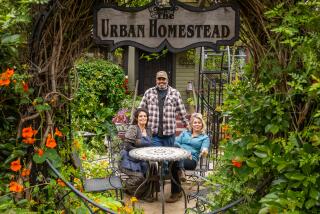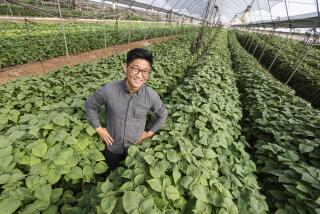Family Builds Dream Restaurant to Save Farm : Economics: Couple open remote dining establishment to supplement their dairy business. Like others across the country, they have found diversification is the key to survival.
- Share via
SHELBURNE, Mass. — Russ and Martha Davenport dreamed that they could save the family farm with a restaurant. But who would drive 3 miles up mountain roads to dine amid roaring tractors, swirling dust and the occasional scent of manure?
The Davenports built it, and they came.
The 3-year-old Davenport Maple Farm Restaurant has attracted customers from 42 states and 10 foreign countries.
Like Kevin Costner’s farmer who built a baseball field on a farm in the movie “Field of Dreams,” Davenport and his wife defied common sense.
The venture is an example of the growing tendency of small farmers to branch into more lucrative businesses to salvage their foundering farms.
“It’s like a great big pie with many pieces. They all seem to fit together,” said Russ Davenport, 62.
Like many dairy farmers, the Davenports faced problems such as prices deflated by oversupply, expensive equipment and consumer wariness of fatty foods.
Other farmers have set up pancake houses or small food stands, but several federal and industry officials said they know of no other commercial farm with a three-meal-a-day, full-menu restaurant.
Mike Dunn, an official with the National Farmers Union, said the Davenports’ success “shows the ingeniousness of our farmers and their ability to stay afloat.”
The U.S. Department of Agriculture said the average farm household earned $5,700 from farming in 1990. But its income from other activities--both on and off the farm--totaled $33,000. Only 56% of those households listed farming as their main occupation.
Martha Davenport said the dairy farm produces about 300 gallons of milk a day but made no profit last year. The restaurant can gross about $5,000 on a good day and helps support four families on the 400-acre farm.
The restaurant is at the edge of the Berkshire Mountains, more than 30 miles from the nearest city, Springfield. It advertises in local newspapers, but Martha Davenport said word of mouth brings in most customers.
They don’t seem deterred by the inconveniences of a farm location.
In winter, customers sometimes keep warm in their cars while waiting for a table. Children look at calves and pigs or play with a family dog. Hikers climb to a fire tower and stop for lemonade on the way down.
Diners gaze at the mountains and sometimes eat to the strains of a bagpipe played in a nearby field by Davenport’s son-in-law.
“Most people, when they go to restaurants, it’s in towns and cities,” said Norman Evans, an English visitor who came with a local family. “This is unusual.”
More than half the products served by the restaurant come from the farm--pork, beef, vegetables, maple syrup and trout raised in a swimming pool.
Dunn said other farmers are setting up welding shops on their farms, making quilts and other crafts, and even providing computer services to neighbors.
He and other farm advocates lament the need for such ventures. But with markets for many farm commodities glutted, such enterprises are likely to continue as an alternative to selling the farm.
Besides running the restaurant and farm, Russ Davenport is a town selectman, lectures at conferences on farm diversification and represents a factory that makes plastic jugs for maple syrup.
But he still thinks of himself mainly as a farmer, works the fields despite severe arthritis and an artificial hip, and frets about his farm’s prospects.
“To me, it’s part of the family that requires someone to keep it together,” he said.
More to Read
Inside the business of entertainment
The Wide Shot brings you news, analysis and insights on everything from streaming wars to production — and what it all means for the future.
You may occasionally receive promotional content from the Los Angeles Times.









